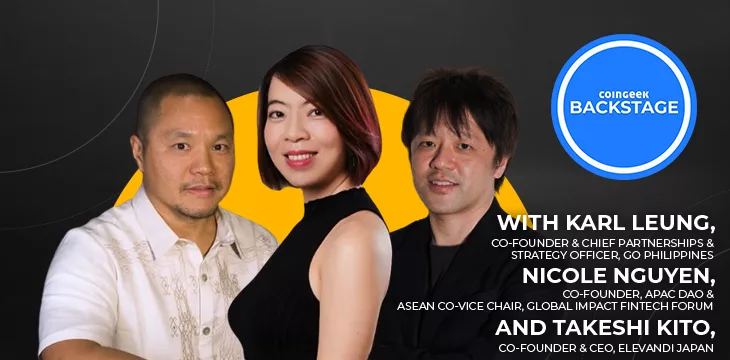|
Getting your Trinity Audio player ready...
|
Despite being a close-knit region, members of the Association of Southeast Asian Nations (ASEAN) have their own set of challenges brought about by numerous factors, including geographical location, macroeconomic conditions, and foreign influence, among others, thus requiring different solutions in addressing these.
This was pointed out by APAC DAO co-founder Nicole Nguyen in an interview with
CoinGeek Backstage at the Blockchain Social Manila prior to the Digital Pilipinas Festival, where she participated as one of the keynote speakers.
While blockchain offers a wide variety of use cases, solutions are not a one-size-fits-all.
Enterprises looking to branch out to Southeast Asia must be able to identify what solutions would cater to the greater majority in a specific country, noting that people nowadays are looking for products and services that they can generally use on a daily basis.
“At this stage, when we’re talking about Web3, it’s not only about changing the world with Web3; it’s about changing your daily life with Web3,” said Nguyen, adding that from here, the adoption of emerging technologies, such as blockchain, will grow.
Nguyen pointed out that in the Philippines, the mass recognition of blockchain use cases began in the gaming industry before being acknowledged in the remittance sector.
While gaming and remittance significantly contribute to the Philippine economy, this is not the case in other parts of Southeast Asia.
“So, [in] a lot of projects, they [enterprises] might want to think about putting their resources into different countries if they want to target Southeast Asia,” advised Nguyen.
“Let’s say for the Philippines, it’s definitely more strong on the metaverse and gaming side; Vietnam on the development side; Thailand may be a bit more on the financial and Web2 adoption since they have a lot of institutions in place,” she added.
Nguyen, who is also the ASEAN Co-Vice Chair of the Global Impact FinTech Forum (GIFT), said the Philippines’ blockchain ecosystem has greatly evolved over time, with the government and industries recognizing the utility of the emerging technology beyond digital currencies.
“I think the Philippines is quite far ahead…compared with other countries in acquiring more uses,” she pointed out.
Blockchain in the big data world
With the Philippines marching toward digitalization, the need for more secure data storage is also becoming more apparent.
In a separate interview with CoinGeek Backstage, Go Philippines co-founder Karl Leung
highlighted blockchain’s transparency in the big data world.
“All the data out there is not necessarily transparent and legit; it has to be tagged, it has to be immutable, and that’s where blockchain comes in. It comes in a system that makes sure that that data, or that particular transaction, is legit, immutable, and…it cannot be faked,” he told reporter Claire Celdran.
This is particularly important as Leung works on an ambitious initiative geared toward developing the Philippines as a smart nation through the Go Philippines One World program.
The program involves pooling the latest technologies, including digital assets, blockchain, and other IT-related resources from different countries and incorporating them into the Philippines to create a smart nation ecosystem, explained Leung.
“It’s like a smart nation ecosystem with steroids,” he said.
Leung said the project will begin in the Philippines before gradually deploying it to its ASEAN neighbors and the rest of the world.
“The goal, really, is to interconnect everybody around the world through this net-centric system. So, we have this big data that can be used not just by the Philippines but by the rest of the world,” said Leung, who is also the project’s chief partnerships and strategy officer.
“The more data you have, the more powerful your analysis and system becomes,” he added.
Driving blockchain adoption beyond ASEAN
As blockchain gains ground in Southeast Asia, Elevandi Japan CEO and co-founder Takeshi Kito believes embracing the technology would yield positive results, particularly in the finance sector.
Kito, through his non-profit organization, is encouraging the use of blockchain in the fintech sector not only in Japan but across Southeast Asia, participating in various initiatives to promote its usage and the adoption of other financial technologies. Japan is a member of the ASEAN Plus Three bloc alongside China and South Korea.
“Blockchain is the key technology in the financial industry,” said Kito, noting that the technology not only offers efficiency by streamlining operations but is also beneficial in the payments industry, paving the way for the introduction of stablecoins and other tokenized assets.
Furthermore, he said blockchain will be a critical tool for advancing Web3. However, Kito pointed out the need to address several challenges to ensure a smooth foray into Web3, including taxation, regulations, and educating the public in emerging technologies.
Similar to the Philippines, Japan’s adoption of blockchain can be seen in the public’s growing interest in digital currencies, with Kito saying that more than six million Japanese have digital asset accounts.
Watch: Why the Philippines is the next startup hub in ASEAN

 03-02-2026
03-02-2026 




